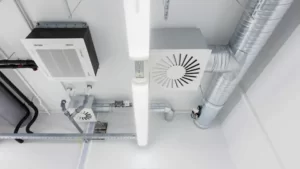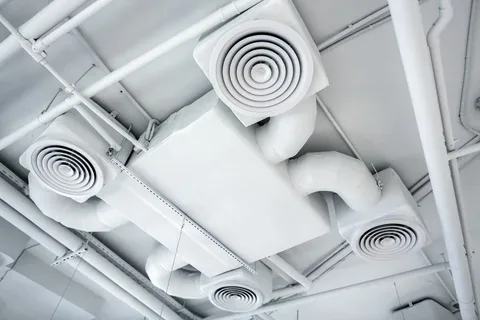A ventilation system in your home provides numerous benefits, allowing you to breathe easier. A ventilation system is designed to bring in fresh air and remove stale air, improving the air quality in your home. From improved indoor air quality to energy efficiency, there are many advantages to investing in a ventilation system for your home. The benefits of having a ventilation system installed in your home are numerous, from reducing allergens to eliminating pollutants. In this blog post, they’ll explore seven advantages of investing in a ventilation system for your home. The fresh air ventilation system allows you to breathe easier and live healthier.
Fresh Air Ventilation Improved Air Quality
The air we breathe indoors can be up to five times more polluted than outdoor air. It is due to the buildup of dust, mould, pet dander, and volatile organic compounds (VOCs) from cleaning products, furniture, and other sources. Fortunately, fresh air ventilation can help to improve indoor air quality by continuously introducing fresh, clean air into your home and removing stale, polluted air.
By introducing fresh air outside, a ventilation system dilutes and removes indoor pollutants. It can significantly reduce the risk of health problems such as asthma, allergies, and respiratory infections. Additionally, the constant flow of fresh air can make your home feel more comfortable and reduce the need for air fresheners or scented candles, which can also contribute to indoor air pollution.
Air ventilation can be especially beneficial in homes with smokers, pets, or individuals with respiratory conditions. The constant fresh air supply can help remove smoke, pet dander, and other irritants from the air, making the home more comfortable and healthy for everyone.
Air Exchanger Reduced Allergens
If you or anyone in your household suffer from allergies, asthma or respiratory issues, you understand how vital clean air is for their health and well-being. The problem with indoor air is that it can contain high allergens and pollutants like dust, pet dander, and mould spores that trigger respiratory problems. Also, an air exchanger in the ventilation system filters the incoming air, removing allergens before circulating inside the house. It means that the air you breathe will be free from allergens and pollutants, which reduces your risk of experiencing allergic reactions or respiratory issues.
 Air ventilation can help to reduce the allergens in your home. Bringing in fresh air from outside can flush out the stale air filled with allergens and maintain an optimal level of indoor humidity, making it less favourable for the growth of allergens like dust mites and mould.
Air ventilation can help to reduce the allergens in your home. Bringing in fresh air from outside can flush out the stale air filled with allergens and maintain an optimal level of indoor humidity, making it less favourable for the growth of allergens like dust mites and mould.
A ventilation system can improve your overall health and well-being by improving indoor air quality. You will experience fewer allergy and asthma symptoms and breathe easier with cleaner, fresher air.
Air Exchange System Mold And Mildew Prevention
Mould and mildew are a homeowner’s worst nightmare. Not only do they cause unpleasant odours, but they can also damage your home and even impact your health. Luckily, an air exchange system can help prevent the growth of mould and mildew in your home.
How does it work? By exchanging stale, humid air with fresh, dry air from outside, a ventilation system helps to reduce the moisture levels in your home. It is essential because mould and mildew thrive in damp environments.
Mould and mildew are more than just unsightly. They can cause various health problems, including respiratory issues, headaches, and fatigue. Investing in a ventilation system can protect yourself and your family from these health risks.
In addition to the health benefits, preventing mould and mildew can save you money in the long run. Mould damage can be expensive, and some insurance policies don’t cover it. By using a ventilation system, you can prevent the growth of mould and mildew and avoid costly repairs.
Overall, air ventilation is a smart investment for any homeowner. Not only will it improve the air quality in your home, but it will also help prevent the growth of mould and mildew, protect your health, and save you money in the long run.
Temperature Control
One of the benefits of having air ventilation in your home is the ability to better control the temperature. With a ventilation system, you can introduce cool air into your home during the hot summer or warm air during the winter months, creating a comfortable living environment year-round. It can reduce your reliance on air conditioning or heating, lowering energy bills and reducing carbon emissions.
Additionally, a ventilation system can help to reduce hot spots and cold drafts in your home, making it more comfortable for everyone. By bringing fresh air into your home and regulating the temperature, you’ll enjoy a more comfortable environment promoting health and well-being.
It’s important to note that not all ventilation systems are created equal, and some may not offer the same level of temperature control as others. If temperature control is important to you, investing in a high-quality system designed to provide efficient, effective temperature regulation is worth investing.
Overall, the ability to control your home’s temperature is just one of the many benefits of air ventilation. With improved air quality, reduced allergens, mould and mildew prevention, energy efficiency, cost savings, and extended equipment life, it’s clear that installing a ventilation system is a wise investment for any homeowner.
The Air Exchange Unit Is Energy Efficient
Not only does an air exchange unit provide improved air quality, but it is also an energy-efficient solution. Traditional heating and cooling systems consume much energy, especially running to compensate for poor indoor air quality. With a ventilation system, the air is filtered and circulated to promote efficiency.
The way that air ventilation works is by introducing fresh outdoor air into the home while also exhausting stale indoor air. It means you are not relying solely on your heating and cooling system to circulate air throughout the home. Introducing fresh outdoor air also means that your heating and cooling system does not need to work as hard to regulate the indoor temperature.
This improved efficiency can greatly impact your energy bills, especially in extreme weather conditions when your heating and cooling systems are running more often. By reducing your reliance on your HVAC system, you can save on energy costs and lower your carbon footprint.
Another added benefit of using an energy-efficient ventilation system is that it can potentially increase the value of your home. Buyers are becoming increasingly interested in energy-efficient features, and a ventilation system that can lower energy costs is a desirable selling point.
Cost Savings
Using an air ventilation system in your home not only improves the air quality and health of your family but it can also lead to significant cost savings. By continuously bringing in fresh air and expelling stale air, your home’s heating and cooling system won’t have to work as hard to maintain a comfortable temperature. It means your HVAC system will use less energy, lowering utility bills.
Additionally, a ventilation system can help prevent mould and mildew growth, which can be expensive to remediate. The constant fresh air flow can also reduce the likelihood of expensive equipment breakdowns or repairs.
Furthermore, investing in a fresh air system can increase the value of your home, making it a smart long-term investment. With the cost savings from reduced energy consumption and maintenance, your ventilation system will pay for itself over time.
Fresh Air System For Home Extended Equipment Life
In addition to the numerous health benefits of using air ventilation in your home, such a fresh air system can also help extend the life of your home’s HVAC equipment. By improving air quality, reducing allergens, and preventing mould and mildew, your HVAC system will not have to work as hard to keep your home comfortable. It means less wear and tear on the system’s components and a longer overall lifespan for the equipment. Furthermore, Fresh Air System For Home is also energy-efficient, which can also help to reduce the strain on your HVAC system. By drawing in fresh air from outside, rather than continually recirculating the same air within your home, a ventilation system can help to regulate the temperature more efficiently and prevent the HVAC system from constantly running at full capacity. As a result, you may see a decrease in your energy bills and maintenance costs.
By investing in air ventilation, you are not only providing your family with the benefits of improved indoor air quality and better respiratory health but also protecting your home’s HVAC equipment and extending its lifespan.
Conclusion
If you want to improve the air quality of your home, air ventilation is a smart investment. Not only does it provide fresh, filtered air to breathe, but it can also help reduce allergens and prevent mould and mildew. Additionally, a ventilation system can help control the temperature in your home and save energy, resulting in cost savings. And it can even extend the life of your equipment.
Related Websites:
Articles on Blogshunt
Articles on tbablogs
Articles on Blogspeoples
Articles on Thebigblogtheory
Articles on Allcityforums

